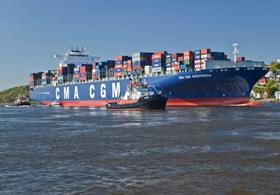
The global container shipping industry is on track for a slow recovery and more stable freight rates as giant alliances take control of the world's busiest sea routes and push smaller players out, the chief executive of United Arab Shipping Co (UASC) told The Wall Street Journal on Friday (26 September).
UASC joined France’s CMA CGM SA and China Shipping Container Lines to form the Ocean Three alliance earlier this month, after Maersk Line of Denmark and Swiss-based Mediterranean Shipping Co announced a similar tie-up called 2M in July.
The two groupings will use the biggest and most fuel-efficient ships in the business to move nearly 60 per cent of all cargo between Asia and Europe, the world's biggest trade loop in terms of capacity, and around 30 per cent and 50 per cent of goods across the Pacific and Atlantic oceans, respectively, The Wall Street Journal said.
'The biggest challenge in shipping is to control your costs, and fuel is the biggest cost,' UASC president and chief executive Jorn Hinge told The Wall Street Journal. 'Modern, big ships carry more cargo using less fuel, and this makes it more difficult for [smaller competitors] to be in the trade.'
Hinge said he expects less volatility in freight rates as smaller ships move out of major ocean routes, and added thatshipping is on a 'slow journey to recovery' after one of the industry's longest downturns, which began with the collapse of Lehman Brothers Holdings in 2008.
He said alliances give partners the flexibility to adjust the number of sailings depending on seasonal demand, something that stand-alone players can't afford.
'If you are in a group and cancel one of your five or six departures during low seasons, you will still be OK as the other departures will still have a full cargo and cater to the needs of your customers,' Hinge said. 'But if you only have two departures and stop one of them, you are dead.'
By sharing ships and ports in sailings between Asia and Europe, Hinge said he expects UASC to cut its operational costs by at least US$100m a year.
Last week, UASC also clinched an alliance with German’s Hamburg Süd that will give it a bigger presence in the South America-to-Europe and South America-to-Asia trade.
Container shipping has suffered for the past decade from overcapacity that has led to falling freight rates, which major operators have described as unsustainable. Smaller shipping companies regularly undercut prevailing rates, hoping to stay in business until the industry recovers, the report said.
Hinge said a new challenge facing the industry is new legislation in parts of Europe and the US to cut sulphur emissions, starting in January.
'When it goes into force, it will basically increase fuel costs by 50 per cent,' he said. 'You either buy new engines that burn cleaner fuels, or mix fuels to cut the sulphur content.'



